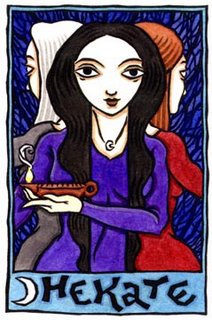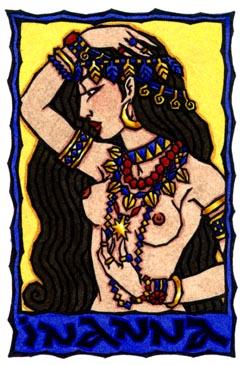 This is Thalia Took's image of Hekate. I love Took's god and goddess imagery, although Hekate here looks less threatening than I envision her. Here we see the Goddess in her triple aspect, as Crone, Mother, and Maiden. She faces three directions because she guards the crossroads. The moon at her throat shows that she is a lunar goddess. And the lamp? I don't know what that symbolizes.
This is Thalia Took's image of Hekate. I love Took's god and goddess imagery, although Hekate here looks less threatening than I envision her. Here we see the Goddess in her triple aspect, as Crone, Mother, and Maiden. She faces three directions because she guards the crossroads. The moon at her throat shows that she is a lunar goddess. And the lamp? I don't know what that symbolizes.I dedicated myself to Hekate at Imbolc for three reasons. The first is simply that she's been with me for some time. Second, I find myself standing at a crossroads in my life with regard to work, career, meaning, and (whether or not to have) children. It's only natural to invoke her. Finally, as I mentioned in an earlier post, I'm interested in Fate. Hekate, in her triple aspect, and also as the death crone, is a Goddess of Fate.
This is the first time I've dedicated myself to a particular aspect of the Goddess (that's how I see the individual goddesses and gods). I have no idea what I'm doing. I've set up a small altar to her, and I wrote an initiation, which I performed at Imbolc. I find myself calling on her at times. But what else does one do? Mostly I'm just waiting to see how Fate manifests itself in my life this year.
I'm reading Liz Greene's book, The Astrology of Fate, which was lent to me by my healer. (In the mystery school I attend, we are each assigned a healer, a student who is further along the path.) Greene is a well-known astrologer and a Jungian analyst; the book is complex and learned. (My old stereotypes suffer.) From the introduction:
The denial of Moira [Fate for the Greeks]...has been a popular Christian theme for many centuries, and it does not require a mind of great brilliance to suspect that this denial rests on grounds somewhat subtler than the argument that fate is paganish. Although medieval Christians from Boethius to Dante acknowledged the pagan tradition of fate side by side with the omnipotence of the Trinity, the Reformation brought with it a conviction that the very idea of such a figure was an insult to God's sovereignty. God sometimes works with a grace which nullifies the influence of the heavens, says Calvin hopefully, and people are often made new by the experience of conversion. Just as the Reformation threw out the "cult" of Mary, it likewise threw out the other numinous feminine power in the cosmos [i.e. Fate].... Since the seventeenth century, we have not spoken of fate.
The theological argument which replaced the ancient goddess and which is still viable today is the doctrine of God's Providence. Even Calvin's gloomy children will argue if one calls by the name of fate the predestined salvation of the elect in which they believe. Those of a more scientific bent revert to the terminology of "natural law;" but the irony of this is that Moira, as she emerged in the thought of Anaximander and the more "scientific" Ionian school of Greek philosophy which [Bertrand] Russell favors over those gullible and mystical Platonists, is nothing more nor less than natural law, raised to the status of deity.




2 comments:
That's a wonderful image but I see more Drusilla from Buffy than Hecate. It's very gothic. Reminds me of a friend's general look as well.
May the coming year provide you with a Fate which is kind, educational, challenging and at times fun. I think we could do with a 2006 which is gentler on us all. x
Yes, Dru if she were slightly kind and slightly less crazy. I love Dru!
Thank you for your kind words. I could use a gentler year. I'll keep reminding myself of that.
Post a Comment